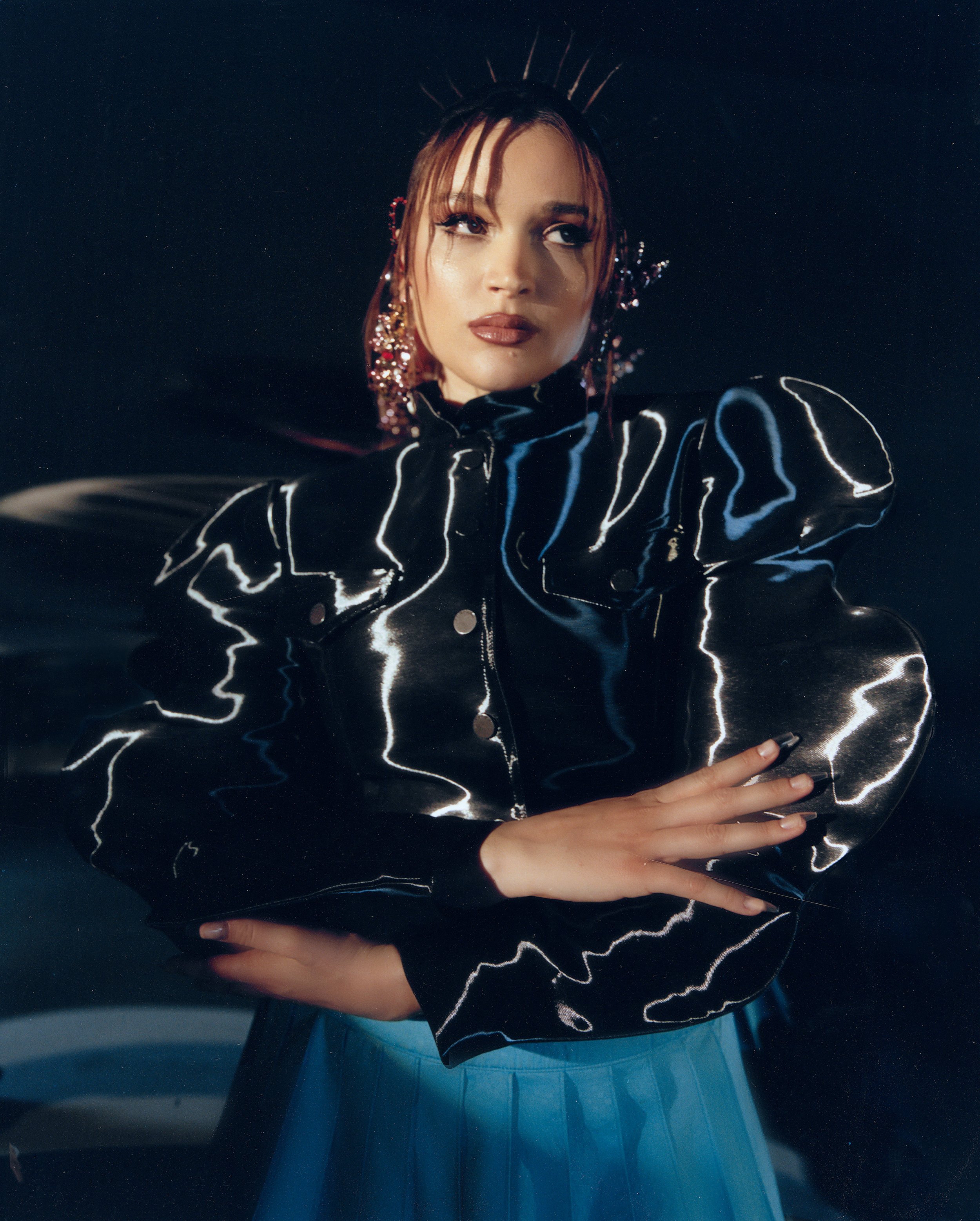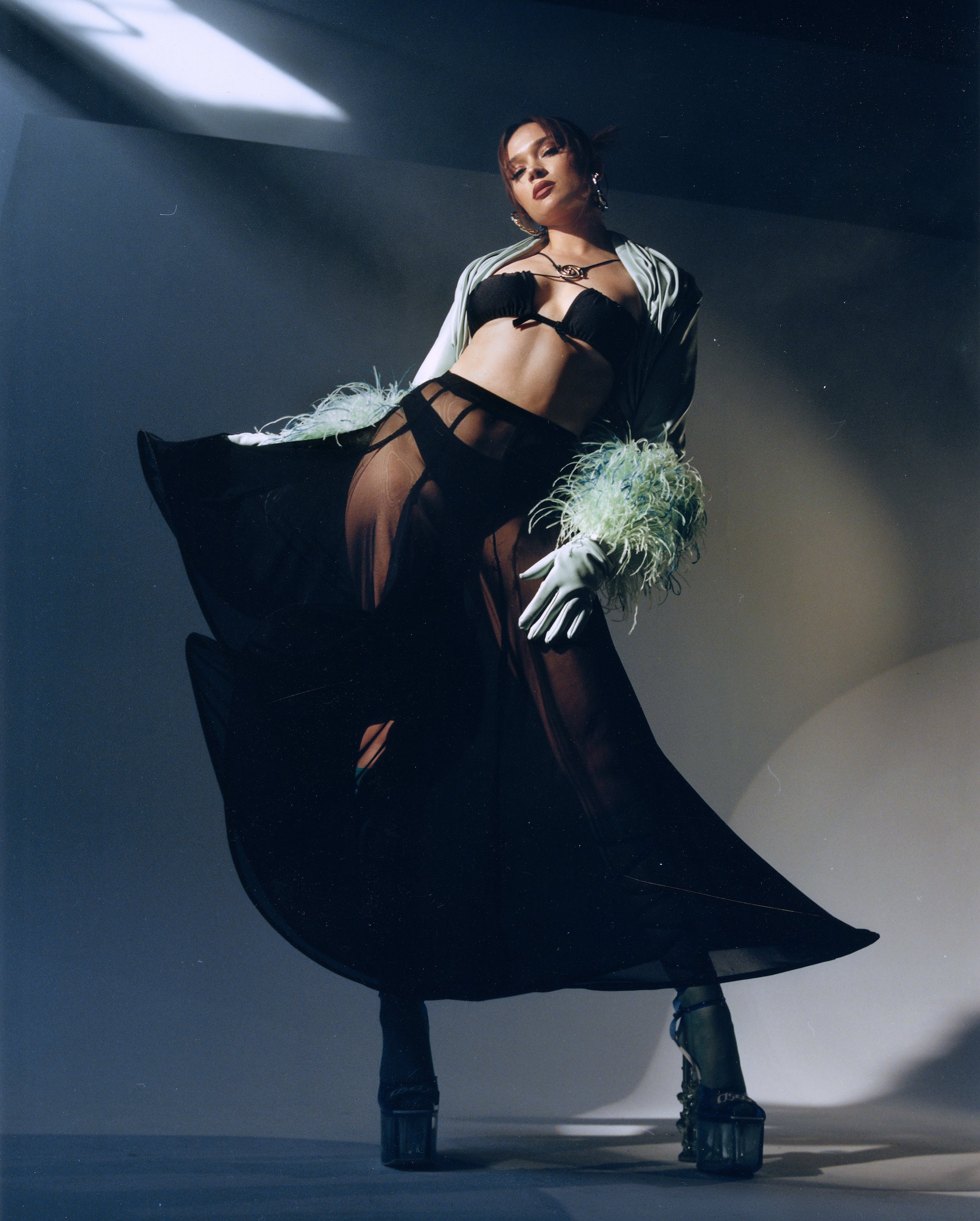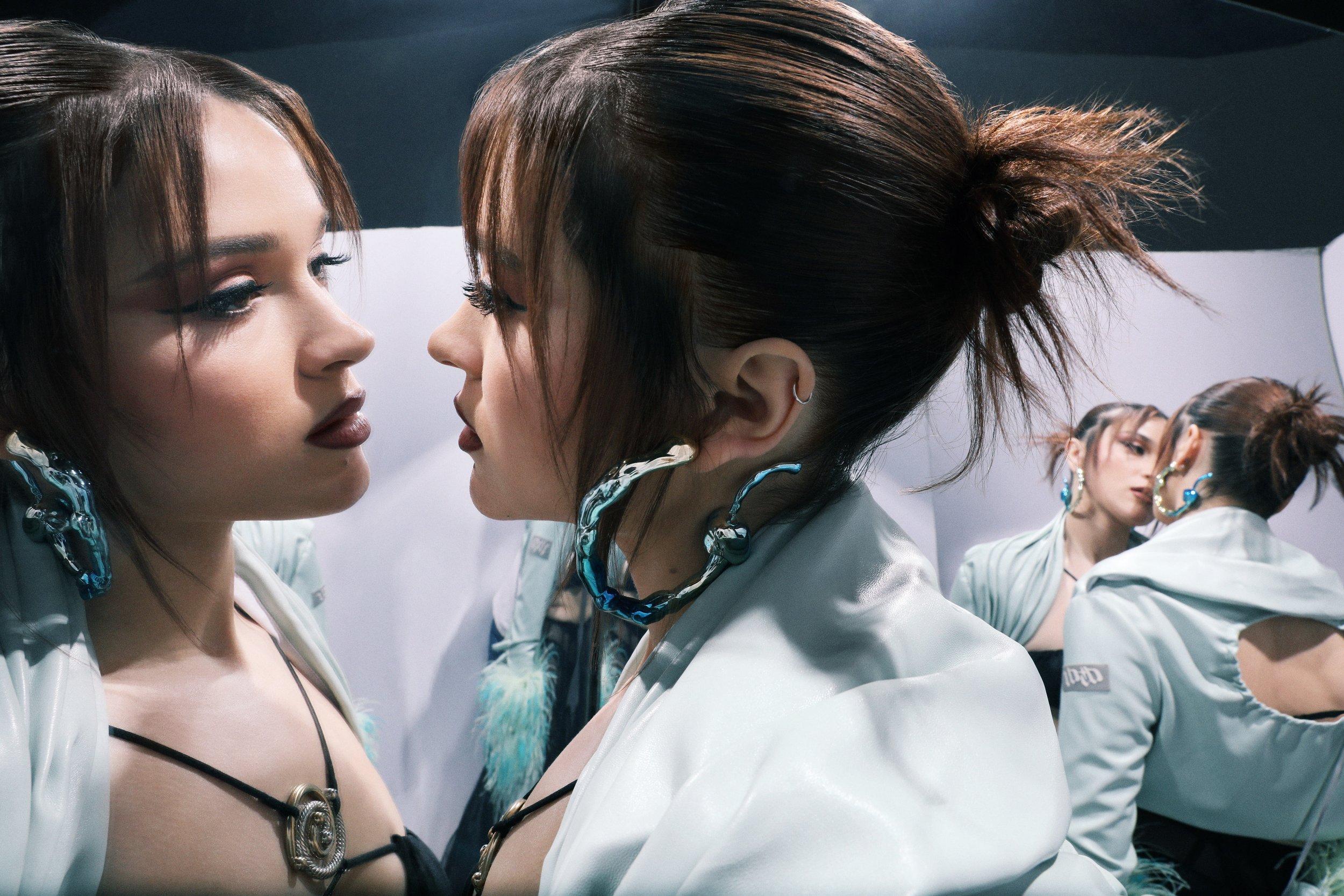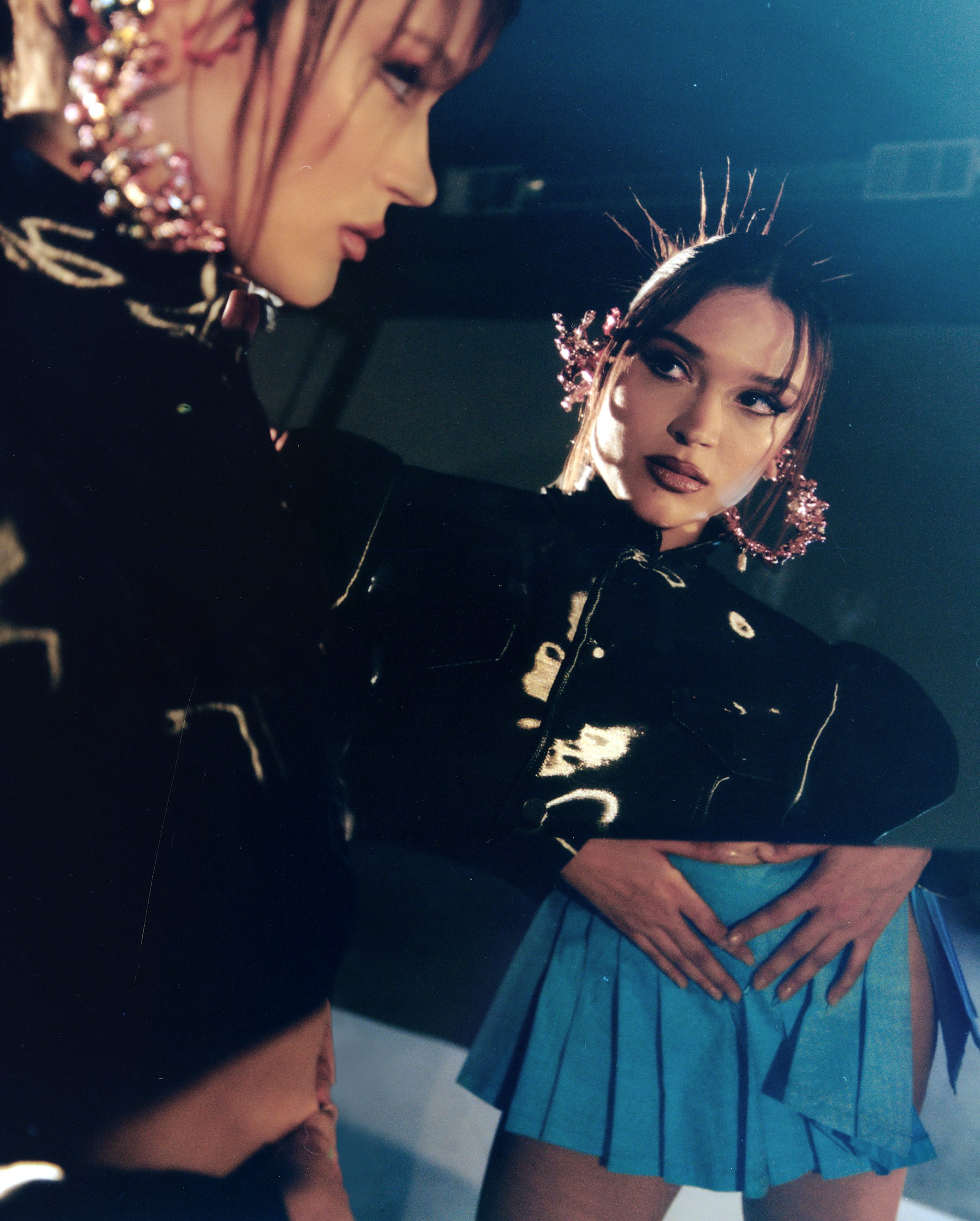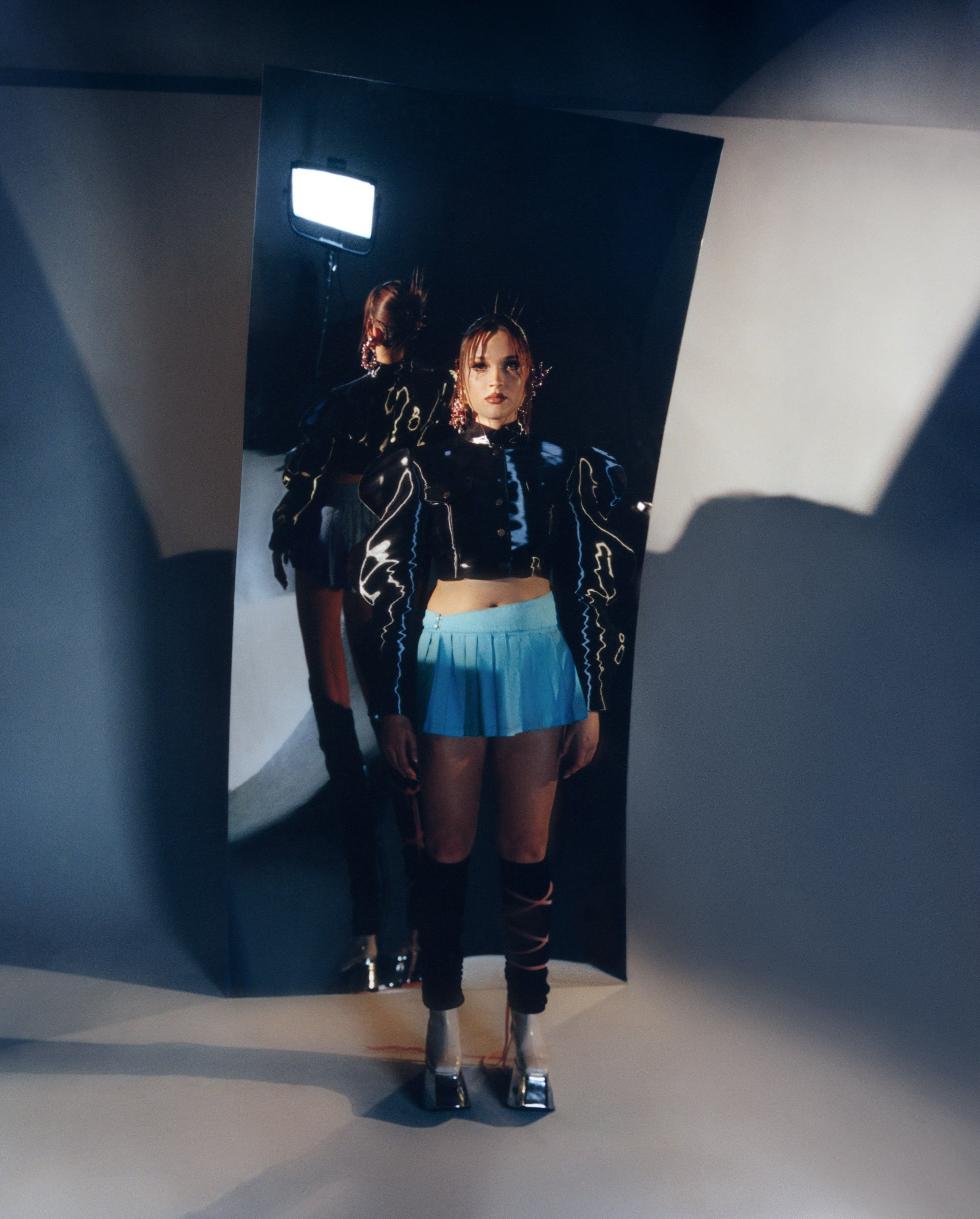Lolo Zouaï Is Not Just Another Popstar
Courtesy of Lolo Zouaï
LOLO ZOUAÏ
Lolo Zouaï Is Not Just Another Popstar
By Bonnie Langedijk
There’s no stopping Lolo Zouaï. From her hit debut album “High Highs to Low Lows”, to song writing on H.E.R’s Grammy-Award winning debut album, to collaborating with Dev Hynes and writing a song for HBO’s Euphoria. And last but not least, opening for Dua Lipa during her “Future Nostalgia” tour. Zouaï’s music has over 250 million collective streams, and close to 1.2 million monthly listeners on Spotify. Blending English, French and Arabic in her lyrics, combined with electronic and R&B beats make for a unique sound. Zouaï’s innate style and strong point of view has also grabbed the attention of the fashion world. With luxury brands such as YSL and Dior to American fashion houses COACH and Tommy Hilfiger all lining up to work with the 27-year-old. And we don’t blame them. During our 35 minute Zoom call with the Paris-born, San Francisco-raised singer and songwriter, we met an outspoken, self aware and intelligent individual who has no plans of slowing down. With Zouaï’s second album “PLAYGIRL” launching on the 14th of October, we wanted to catch up with the singer, songwriter and producer about her new album, the creative process beyond the music and her love of thrifting.
Courtesy of Lolo Zouaï
Courtesy of Lolo Zouaï
Bonnie: When you started out in the music business you did it by yourself. How did you figure out the inner workings of the industry?
Lolo: You have to go with your intuition. Make mistakes so you [learn how to] read people. Early on, a producer I worked with said that to put up my songs I had to sign this contract. If I had signed it, he would’ve owned all my music. It was a horrible contract. And he was framing it as, if I wouldn’t sign it, he wouldn’t work with me. It was a really rough start to the music industry for me because I thought we had built this real relationship. I realized I was going to have to try again.
That must’ve been difficult. Regardless, your career has taken off quickly. What was the most difficult part to adapt to?
Lolo: The main thing that’s changed is that I’ve been able to make music my everyday job. I don’t have to work at a restaurant anymore. I have my own apartment, I have a car. I have the time and the space to make the music that I want to make. My first album came out in 2019, and that album actually did a lot for me. Things were moving really fast, and instead of living in the moment I was wanting more. The pandemic was a real slow down for me. The momentum and then the loss of momentum was difficult. Because I was ready to go.
“The MOMENTUM and then the loss of momentum was difficult. Because I was ready to go.”
Let’s talk about your new album, it’s launching very soon. How would you say this album relates to the previous one?
Lolo: There’s three characters in the album, and three different styles of music. In the first album I was just introducing myself and what I had gone through to get to the album. But things changed. I wasn’t financially struggling as much. I wasn’t working at a restaurant so I couldn’t really sing about that anymore. I had to think about who I was and what I had to say. I spent most of 2020 trying to write an album and I ended up writing really dark stuff. It didn’t feel right. I started therapy and she said: “Maybe it isn’t healthy that you can only write when you’re sad. Take this water bottle, technically you could write a beautiful song about this. You don’t have to be in emotional turmoil to write a song.” I took that advice to heart, and came up with this idea for “PLAYGIRL”. For this album I worked with an engineer so the quality of the sound is much better than the first album. It sounds elevated and I’ve gotten better at making music and writing songs.
I would compare it to designing one hit item and from there everyone wonders: What’s next? You want that recognizability so people understand its relation to the first one but you also want to say something different or new, right?
Lolo: Yes! I personally like to see the evolution of artists. With The Weeknd, I loved his first projects that were really dark and moody, but then he wanted to do something different. Some people didn’t like it, but most people loved it because he’s huge. I want people to give it a chance. It may seem like it’s one thing, but it’s actually very me. I have all the same core values. I’m singing, I’m doing harmonies, I’m doing ad libs, I’m mixing languages but it’s more confident and less depressing.
Is there anything you hope people take away from it?
Lolo: There’s this one song ‘Room’, that’s about being taken advantage of and wanting to plot revenge. It's revenge in your mind, because you’re not actually going to do it. That song, to me, was one of the songs that gave the depth of the album to enjoy the fun songs. A ‘PLAYGIRL’ is usually a woman who is promiscuous or has a lot of lovers and doesn’t settle down. Why do women become that way? Why do they become closed off? Is it maybe because they’ve been taken advantage of? Or they’ve been hurt so they protect themselves? There’s a deeper arc to the story. Definitely that. And then also that you don’t have to be one thing. You’re allowed to be multifaceted. Be confident, be a little reckless, be a little childish and sexy all at the same time.
Media plays a big part in that, not allowing people to be more than one thing, while no one lives their life that way.
Lolo: At first, whenever I’d get press it was always the same headline: “French-Algerian singer”. And I would think: “Okay dude.. I’m more interesting than my ethnic background, you know? Can we maybe talk about my music or what it means?” It’s this claw machine and I’m this puppet. But I choose to play along with it now. The media loves to box you, because that’s how they understand it. I get that’s how it works, but it can be frustrating because it makes you think: “Is that all I am?”
Completely. Since we’re on that topic, what’s your approach to building your image and everything beyond the music? Your aesthetic, and the creative direction of photoshoots and videos?
Lolo: I’m very hands-on with every single thing that I do. I have a very strong vision. Whenever I write a song, I see the world that it’s in. I like to write songs with very visual, detailed lyrics and fun titles. So the song writing comes directly with the imagery. From there I put together moodboards for each song and figure out how it can come to life. What kind of styling? What kind of hair style? We work with a creative team and they help me facilitate it and organize it. The album cover I just put out, that was pretty much the idea in my head. It’s crazy to think I did [that]. We released an album trailer, and I edited it according to my vision and the story I wanted to [tell]. I realized I should start talking about this more, because people always assume: “She probably doesn’t write her own music” or “there’s probably someone doing this for her”. But I’m not just a singer. I’m a songwriter, I’m a producer. I’m involved in every step of the way. If I wasn’t, I wouldn’t want to do it. That makes my music unique to me. I’m not trying to be anybody else.
I also can’t really imagine, if you’re a creative being, letting go of other creative things that are so close to you.
Lolo: I know! But there are some artists or singers who don’t care as much about the vision. In the music industry there’s two paths to success. One is more down the middle, easy to digest music, that’s easily playlisted and easily marketable. And then there's more left of center, but also still could be mainstream type of music, that’s more artistic and weirder. That’s the path I’ve chosen to take.
Courtesy of Lolo Zouaï
Courtesy of Lolo Zouaï
I want to dive into fashion. You’ve worked with a lot of big fashion brands. How do you stay true to your own style, when you are working with these companies?
Lola: Once your brand and your imagery is strong enough, brands will adjust to you. At the beginning [of my career] I would wear things that didn’t feel like me. There’s nothing worse than wearing an outfit that you don’t like. And sometimes you don’t realize it until later. Until you’re photographed. When I don’t feel confident in what I’m wearing I shut down a little bit. It’s hard, but you have to find the balance between making it work for their brand and making it work for you.
Do you have any fashion brands you would love to work with?
Lolo: There’s a few. I love Kenzo, Ilove Heaven by Marc Jacobs. And then there’s smaller brands, a lot of London-based designers.
Yes, I saw you worked with Chet Lo.
Lolo: Yes Chet Lo, Mimi Wade and Chopova Lowena. The UK just knows. I used to not want to spend money on clothes like that but now I think: “This is an independent designer. She’s a woman.” I want to support that, and it’s good quality. It’s better to buy from those companies than from Forever21.
Yes. It’s also an opportunity to platform each other. Many brands either go for really big artists, or artists only work with really big brands and it’s great when you can grow together in a way.
Lolo: I love that for all things. Whether it’s photographers, make-up artists. My goal is always to find my long-term team. You’ve got to date around for a long time to be like: “When I pop off, this is the make-up artists I want to go with.” It’s a lot of trial and error in that sense.
I also heard you love thrifting.
Lolo: I started doing that in high school. There’s this thrift store in San Francisco called “Thrift Town”, that closed recently, [which] is in my first music video for the song “So Real”. It’s forever on The Internet. Growing up in San Francisco we were taught about the environment, and the issues with the environment very early on. With thrifting you’re not buying new, you’re reusing. I love being able to find things that could be worth way more but they just didn’t know. I love finding old Tommy Hilfiger, old Guess. And when you go to Europe, the brands are different. That’s the beauty of thrifting.
I didn’t want to lead with this question, because as we talked about, the media loves to generate a certain headline. But you’ve just been on tour with Dua Lipa. How was that?
Lolo: It was supposed to happen in 2020, and I thought it was going to happen at all. To be able to do it was incredible. Everyday, to wake up in a new parking lot of an arena and carry my big ass suitcase. After the first show, the first thing Dua asked me was: ‘Did you have fun?’ That is what she cares about: Did I have fun? Did I enjoy myself? She works so hard and she really enjoys it. It’s pretty awesome. I [thought to myself]: “Damn, I should be more like that.” It was an honor to watch that show every night. I have big goals too, and seeing it made me think that maybe I can do it too.
I think it’s always great when women are supporting other women.
Lolo: She brings women, her openers, she always shouts out her friends. It’s really cool to see someone at her level be respectful in that way. It was a great experience. Some people don’t want to support other women, because they have jealousy. If we would all just let go of all of that we would all be winning.
This interview has been edited and condensed for clarity.
